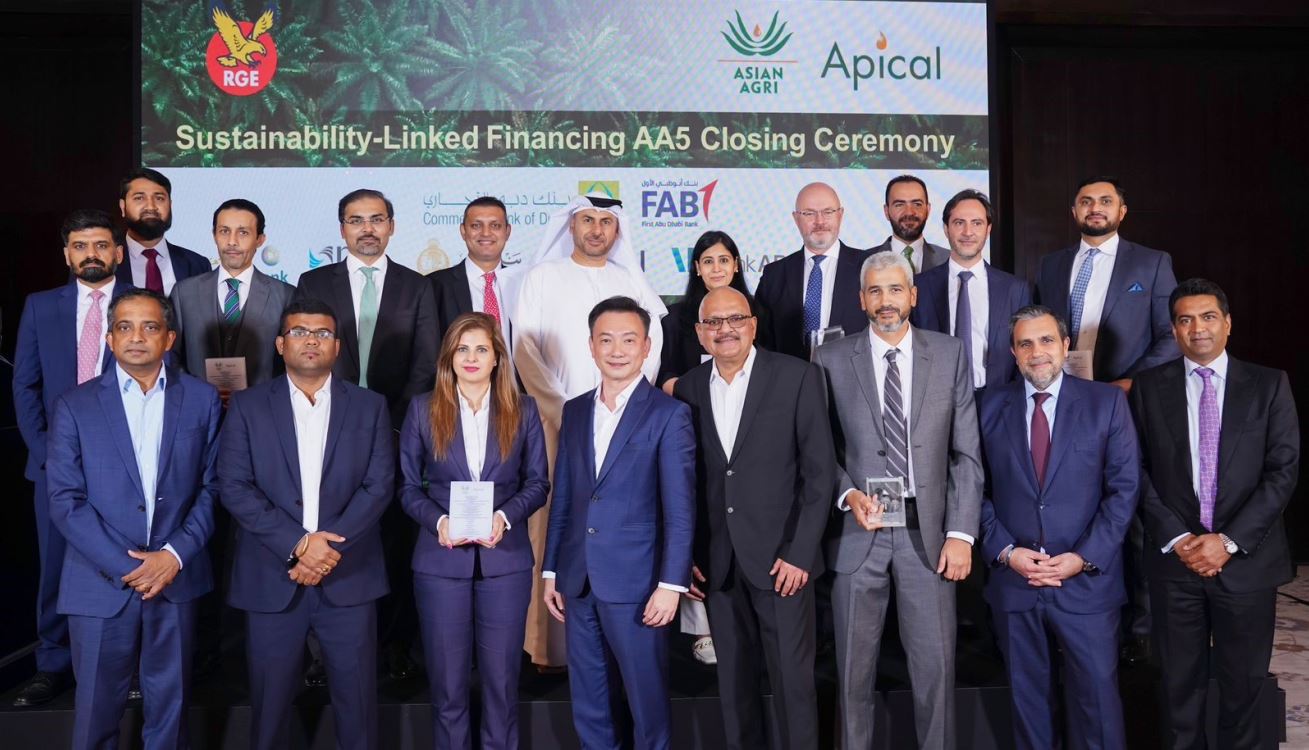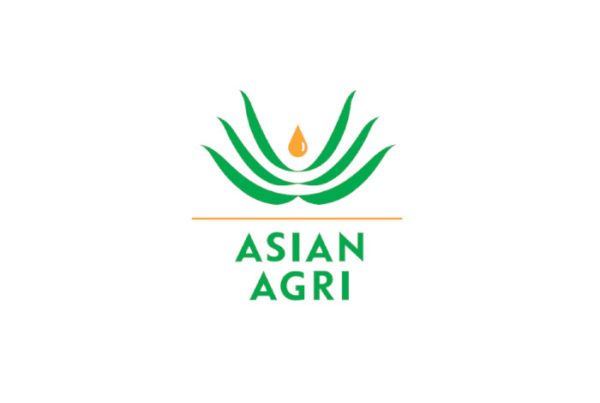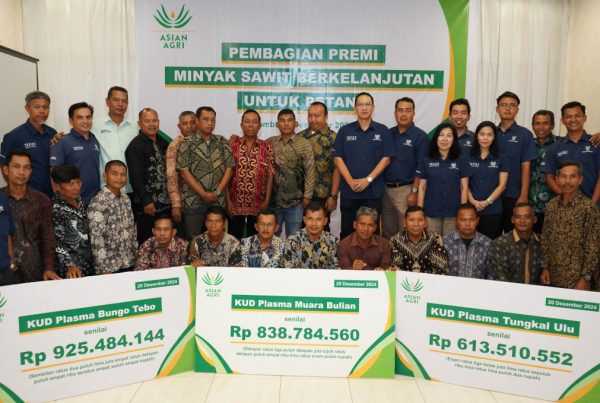Singapore, 24 January 2024 – Asian Agri and Apical Group, integral members of the RGE group, are proud to announce that they have completed a three-year, US$1 billion Sustainability Linked Loan (SLL). SLLs play a crucial role in promoting environmentally- and socially- responsible business practices. By linking the terms of the loan to key sustainability metrics, we are taking a proactive approach to driving positive change and fostering long-term sustainability across our operations.
For more information, read the press release bellow.
Press Release
RGE closes US$1 billion Sustainability-Linked Loan and US$1 billion Sustainability-Linked Derivative with a Consortium of International Banks
Singapore, 24 January 2024 – RGE, a Singapore-headquartered multinational group of resource-based manufacturing companies, today announced the closing of a three-year, US$1 billion Sustainability-Linked Loan (SLL) for its sustainable agribusiness group consisting of Asian Agri and Apical. The SLL, which includes a US$150 million Murabaha term facility that is AAOIFI[1]-compliant, marks RGE’s inaugural sustainability-linked Islamic financing and serves as a catalyst for the company’s continued strategic expansion into key regions, including the Middle East where its local operations are witnessing exponential growth.
The US$1 billion SLL will be used to support RGE’s agribusiness’ operations, growth and expansion across its diverse product offerings to further contribute to the bioeconomy. It is also tied to key performance indicators (KPIs) to enhance:
- Engagement with the number of suppliers carrying out independent traceability verification
- Utilisation of energy derived from renewable and clean energy sources, and
- Collaboration with NDPE[2]-compliant suppliers.
By embedding sustainability throughout the entire traceable and transparent supply chain, from cultivation to consumption, Asian Agri and Apical will enhance the value for its customers and partners, offering them environmentally and ethically sustainable products. This commitment aligns with the key actions discussed at the recently concluded COP28, where accelerating decarbonisation and pace of change is pledged by the heads of states and private sector leaders.
Independently validated by a third-party sustainability consultant, the pre-agreed environmental performance targets or KPIs for the SLL have been set as a tool to help the company better align its efforts to accelerate the achievement of its sustainability targets. In the event that the company is not able to meet the KPIs that are set as part of the agreement for the financing, it will have to pay a higher interest rate on the loan.
RGE secured its first SLL in 2021 and has committed to 100% of its financing needs to SLLs. Its latest SLL garnered strong support from its financing partners comprising a consortium of eight Mandated Lead Arrangers and Bookrunners (MLABs), and was 1.4 times oversubscribed on its US$1 billion amount. Through this transaction, RGE has fortified relationships with existing financing partners and established new partnerships with a number of financial institutions in the Middle East.
To fully hedge the interest rate risk of the SLL, RGE also added a Sustainability-Linked Derivative (SLD), an interest rate swap[3], for its SLL. The US$1 billion SLD is also linked to the company’s achievement of the same pre-defined KPIs as the SLL. If these environmental performance targets are not met, the company will need to payback a pre-agreed amount to the banks.
When RGE introduced its first SLD to partially hedge the interest rate risk of Apical’s SLL in early 2023, it said that the SLD facilitates an even greater level of accountability from the company and reiterated its confidence in delivering on its commitments.
Patrick Tan, Head of Banking, RGE, said: “This transaction is meaningful in three ways. First, it is testament to the confidence that our financing partners have in our growth story, and in the positive impact we continue to make on our sustainability journey. Second, the inaugural sustainability-linked Islamic financing further strengthens our relationships with Islamic financial institutions in the Middle East and shows our continued support for the region’s growth in green financing. Finally, our US$1 billion SLD, tied to the same KPIs as our SLL, is an innovative and green way of hedging interest rate risk. It also demonstrates our commitment to continue to deliver on our sustainability KPIs.”
The eight MLABs appointed are Commercial Bank of Dubai PSC (CBD), E.SUN Commercial Bank, Ltd., First Abu Dhabi Bank PJSC (FAB), Hua Nan Commercial Bank, Ltd., Industrial Bank Co., Ltd, MUFG Bank, Ltd. (MUFG), Shanghai Pudong Development Bank Co, Ltd. and Bank of Communications (Hong Kong) Limited.
MUFG is the Lead Sustainable Finance Advisor on the transaction, with CBD and MUFG as Joint SLD Coordinators, and FAB as the Islamic Advisor.
As one of the largest global producers in the bioeconomy where the source material for life’s essential goods is manufactured into products used by billions of people every day, RGE is dedicated to responsible growth and expansion and has transitioned all its financing to SLLs. In the year ended 2023, RGE has successfully secured in excess of US$1 billion of SLLs.
[1] Accounting and Auditing Organisation for Islamic Financial Institutions
[2] No Deforestation, No Peat, No Exploitation
[3] Interest rate swaps are forward contracts where one stream of future interest payments is exchanged for another, based on a specified principal amount. The aim of these swaps is to reduce or increase exposure to fluctuations in interest rates.
About RGE – www.rgei.com
Headquartered in Singapore, RGE is a group of resource-based manufacturing companies with global operations. We produce sustainable natural fibres, edible oils, green packaging and clean natural gas used to create products that feed, clothe and energise the world. We help improve billions of peoples’ lives through sustainable products they use every day. With more than US$35 billion in assets and 70,000 employees, we are creating a more recyclable, biodegradable and lower carbon future.
Committed to sustainable development, conservation and community development, we strive towards what is good for the community, good for the country, good for the climate, good for the customer, and good for the company. With current operations spanning across Indonesia, China, Brazil, Spain and Canada, we continue to expand and engage new markets.
About Asian Agri – www.asianagri.com
Asian Agri is one of Indonesia’s largest palm oil producers. Founded in 1979, the company today manages 100,000 hectares of plantation land and employs over 20,000 people. A pioneer of the Indonesian government’s Trans-National Government Migration (PIR-Trans) program, Asian Agri currently works with 30,000 Plasma Scheme smallholders in Riau and Jambi who operate 60,000 hectares of palm oil plantations, and independent smallholders who manage a total 41,000 hectares.
Implementing a strict “no burn” policy since 1994 and best practices in sustainable plantation management, Asian Agri has helped its smallholder partners improve productivity, yield and supply chain traceability, while assisting them obtain certifications. The company’s mills are technologically advanced and energy self-sufficient, minimizing greenhouse gas emissions.
All business units of Asian Agri has the Indonesian Sustainable Palm Oil (ISPO). Currently, all Asian Agri’s plantations in North Sumatra, Riau & Jambi provinces and Plasma Scheme smallholder plantations in Riau & Jambi provinces have been 100% RSPO (Roundtable on Sustainable Palm Oil) certified. In addition, ISCC (International Sustainability & Carbon Certification) has been achieved by all plantations owned by Asian Agri and the smallholders it supports.
The company’s operations are ISO 14001 certified, while its Learning Institute and nursery research center in Pelalawan, Riau province, Indonesia are both ISO 9001 certified. Asian Agri’s laboratory at the Center for Research and Development in Tebing Tinggi is accredited by the National Accreditation Committee under the ILAC Mutual Recognition Arrangement (ILAC MRA).
About Apical – www.apicalgroup.com
Apical is a leading vegetable oils processor with an expanding global footprint. Apical’s vertically integrated mid-stream refining, downstream processing capabilities and capacity makes Apical an integral supplier that supports the food, feed and fuel needs across industries. Its business includes downstream processing into functional and specialty fats, oleochemicals and biodiesel among others, for domestic use and international export. Its operations are located in Indonesia, China and Spain, and include eight refineries, four biodiesel plants, four oleochemical plants and three kernel crushing plants. Through its joint ventures, Apical also has processing and distribution operations in India, Pakistan, Philippines, Vietnam, Myanmar, Brazil, Dubai and USA.
Media Contact
Lim Siow Joo
Corporate Communications, RGE
Tel: +65 9847 0817
Email: siowjoo_lim@rgei.com





